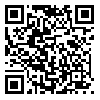Volume 1403, Issue 2 (8-2024)
2024, 1403(2): 0-0 |
Back to browse issues page
Ethics code: IR.MEDILAM.REC.1400.156
Download citation:
BibTeX | RIS | EndNote | Medlars | ProCite | Reference Manager | RefWorks
Send citation to:



BibTeX | RIS | EndNote | Medlars | ProCite | Reference Manager | RefWorks
Send citation to:
Taghinejad H, Nazari H, Sayehmiri K, naghib zadeh S M. Title: The effect of empowerment on the level of participation in care and anxiety at the time of discharge of mothers of infants admitted to the neonatal intensive care unit in Ayatollah Taleghani Hospital in Ilam in 2021.. Journal title 2024; 1403 (2)
URL: http://newresearch.medilam.ac.ir/article-1-1503-en.html
URL: http://newresearch.medilam.ac.ir/article-1-1503-en.html
Abstract: (1483 Views)
This proposal has no abstract.
Received: 2021/06/3 | Accepted: 2021/09/18 | Published: 2024/08/31
پادکست [MP3 1072 KB]
نوع فایل: تعهد از نوع رسانه
عنوان فایل: پادکست
سال تعهد: 0
منبع:
چکیده:
(33 Download)
نوع فایل: تعهد از نوع رسانه
عنوان فایل: پادکست
سال تعهد: 0
منبع:
چکیده:
(33 Download)
Send email to the proposal executer
| Rights and permissions | |
 | This work is licensed under a Creative Commons Attribution-NonCommercial 4.0 International License. |






